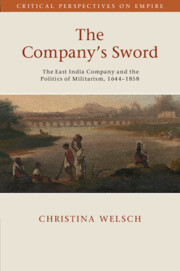
-
Select format
-
- Publisher:
- Cambridge University Press
- Publication date:
- September 2022
- August 2022
- ISBN:
- 9781108983112
- 9781108833882
- 9781108987349
- Dimensions:
- (229 x 152 mm)
- Weight & Pages:
- 0.588kg, 304 Pages
- Dimensions:
- (229 x 152 mm)
- Weight & Pages:
- 0.45kg, 302 Pages
You may already have access via personal or institutional login
Book description
In the late eighteenth century, it was a cliché that the East India Company ruled India 'by the sword.' Christina Welsch shows how Indian and European soldiers shaped and challenged the Company's political expansion and how elite officers turned those dynamics into a bid for 'stratocracy' – a state dominated by its army. Combining colonial records with Mughal Persian sources from Indian states, The Company's Sword offers new insight into India's eighteenth-century military landscape, showing how elite officers positioned themselves as the sole actors who could navigate, understand, and control those networks. Focusing on south India, rather than the Company's better-studied territories in Bengal, the analysis provides a new approach, chronology, and geography through which to understand the Company Raj. It offers a fresh perspective of the Company's collapse after the rebellions of 1857, tracing the deep roots of that conflict to the Company's eighteenth-century development.
Awards
Runner up, 2023 The British in India Book Military History Book Prize, The British in India Historical Trust
Co-winner, 2023 NACBS John Ben Snow Prize, North American Conference on British Studies
Reviews
‘Professor Welsch vividly highlights the crucial significance of European military officers in the dynamic creation and expansion of the English East India Company’s rule over India. She thus adds erudite depth to our understanding of the martial foundations of British colonialism.’
Michael Fisher - Oberlin College
‘The Company’s Sword is a thorough evaluation of the EIC’s army as more than just a tool of empire, but interpreters of its authority. This book shows how European officers in India established and maintained rule 'by the sword' as a concept of empire that endured until 1857 and beyond.’
Kevin Linch - University of Leeds
‘This is an excellent and highly readable book that offers a significant new interpretation of the travails of the East India Company and its armies in the century or so leading up to the end of Company rule in South Asia.’
Margaret R. Hunt Source: Journal of British Studies
Contents
Metrics
Altmetric attention score
Full text views
Full text views help Loading metrics...
Loading metrics...
* Views captured on Cambridge Core between #date#. This data will be updated every 24 hours.
Usage data cannot currently be displayed.
Accessibility standard: Unknown
Why this information is here
This section outlines the accessibility features of this content - including support for screen readers, full keyboard navigation and high-contrast display options. This may not be relevant for you.
Accessibility Information
Accessibility compliance for the PDF of this book is currently unknown and may be updated in the future.


